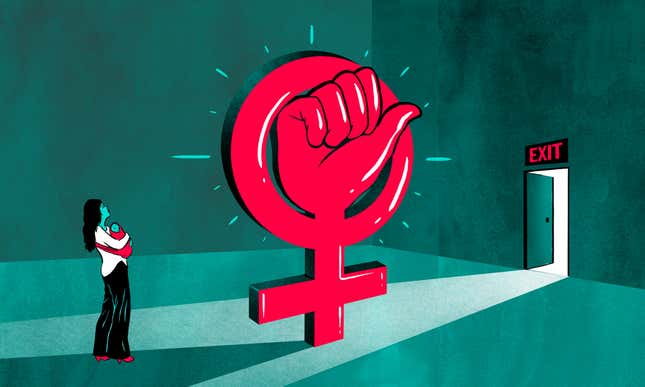I Was Asked to Leave a Women's Empowerment Seminar for Bringing My Baby Girl
Latest

I walked into the darkened auditorium of the conference center at nine in the morning, with my baby girl Olivia strapped to my chest in her wrap. Linda Gray of Dallas was speaking to a large audience of women. I stood at the back of the room with Olivia, while my friend Angela, who had come to the conference to help with Olivia, went to find a place where we could set up for the day ahead.
Olivia made a few baby peeps in her wrap, and I ducked out of the room behind someone else who was to take a call on her ringing phone. Through the open doors, I could hear Linda talking about becoming a successful actress at age 37, how her children were proud of her for her work. No woman should ever give up on her dream, she said. I felt reaffirmed as both a professional and a mother—like I’d been right to think my ambitions didn’t have to be postponed.
My friend, a former TV producer now in her seventies, had asked me to speak on her panel while I was third-trimester pregnant. I’d been happy to say yes. We were both humor writers and bicoastal entertainment industry expats in our small beachside town, and our age difference—I’m 35—had never been a barrier to our friendship. After I had Olivia, she came over bearing gifts. We talked about the panel again. I could go to the entire event, she said, for the networking opportunities, lunch, and wine hour at the end. Great, I thought. I’ll strap Olivia on and stay until the sun goes down. Angela had agreed to hold baby while I spoke on the panel or take her out of the room if she fussed, so it seemed like no problem. Many women can’t afford childcare. Why not be all about my career with my newborn strapped to my chest?
When Linda left the stage and women shuffled toward the book-signing table, I met eyes with my friend and walked through the event space toward her to say good morning. She looked stressed. The panel will be great, I hoped I could reassure her.
“Where is the babysitter?” she asked without a hello. And I realized the stress was about me.
I looked down at Olivia, on the verge of falling asleep in her wrap. Taken aback, I pointed toward the back of the room, toward the spot we’d found next to a back door so Olivia could be rapidly removed should crying happen.
“I heard the baby during the talk,” she continued. “I can’t have her interrupting the speakers.”
“She made two peeps and I took her out,” I said.
“You can’t have the baby in here.”
-

-

-

-

-

-

-

-

-

-

-

-

-

-

-

-

-

-

-

-

-

-

-

-

-

-

-

-

-

-

-

-

-

-

-

-

-

-

-

-








































